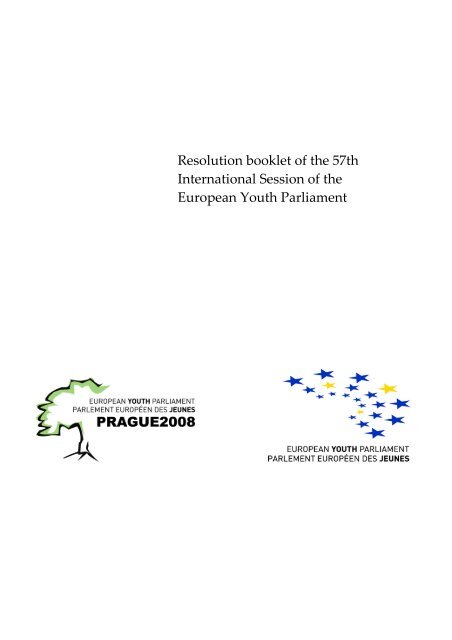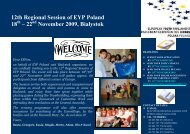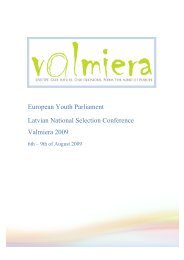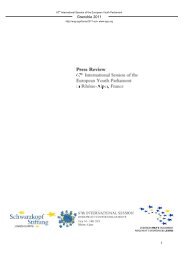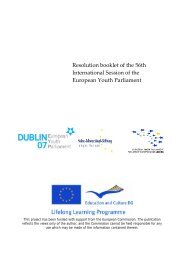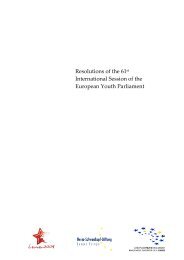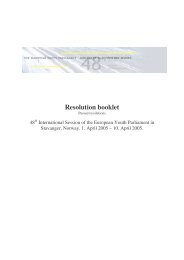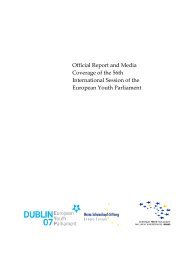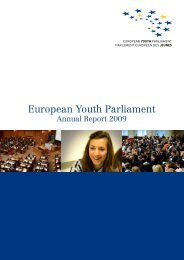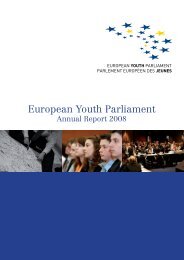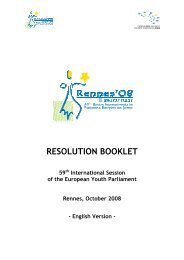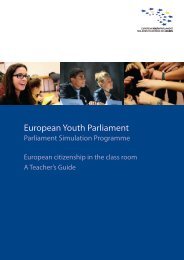Resolution - European Youth Parliament
Resolution - European Youth Parliament
Resolution - European Youth Parliament
You also want an ePaper? Increase the reach of your titles
YUMPU automatically turns print PDFs into web optimized ePapers that Google loves.
<strong>Resolution</strong> booklet of the 57th<br />
International Session of the<br />
<strong>European</strong> <strong>Youth</strong> <strong>Parliament</strong>
<strong>Resolution</strong>s of the International Session of the <strong>European</strong> <strong>Youth</strong> <strong>Parliament</strong> in Prague,<br />
2008:<br />
1. Committee on Industry, Research and Energy II (ITRE II)<br />
Nuclear power: safest of all options? With renewable energy still in its infancy and<br />
lowering carbon emissions as a political priority, what approach should <strong>European</strong> states<br />
take regarding nuclear energy?<br />
2. Committee on Climate Change I (CLIM I)<br />
The <strong>European</strong> Commission’s energy and climate change package: too far-reaching or the<br />
right way? What steps should the EU take towards a low-carbon economy without hurting<br />
<strong>European</strong> competitiveness?<br />
3. Committee on Foreign Affairs II (AFET II)<br />
A new horizon or a red herring? What prospects of peace does the Annapolis Conference<br />
and the aftermath bring for the Middle East and what measures should the EU take to<br />
support the process?<br />
4. Committee on Budgets (BUDG)<br />
Globalisation, climate change, energy security, immigration and integration, growth and<br />
jobs: is the EU’s budget out of kilter with the policy challenges confronting it? How should<br />
the EU modernise and reform the current budget?<br />
5. Committee on Civil Liberties, Justice and Home Affairs II (LIBE II)<br />
Free movement of labour in an enlarged EU: risks of a second-class EU citizenship?<br />
What measures should EU member states take with regard to the movement of the<br />
labour force and access to labour markets?<br />
6. Committee on Civil Liberties, Justice and Internal Affairs I (LIBE I)<br />
With the prospective of a <strong>European</strong> blue card and the French calls for a <strong>European</strong> pact<br />
on immigration, has time come for creating a <strong>European</strong> migration policy? On what<br />
principles should such a policy be founded?<br />
7. Committee on Industry, Research and Energy I (ITRE I)<br />
Carbon storage: investing for the future? What technological solutions should the EU<br />
invest in to reduce the release of carbon dioxide in the atmosphere?<br />
8. Committee in International Trade (INTA)<br />
Asia and its emerging economic powers: a challenge for <strong>European</strong> trade interests? What<br />
strategy should the EU adopt to maximise the historic and economic ties that already<br />
exist with Asia?<br />
9. Committee on Agriculture and Rural Development (AGRI)<br />
The Common Agricultural Policy (CAP): a barrier or an asset to competitiveness? What<br />
role should agriculture and the CAP play in a modern Europe?<br />
10. Committee on Transport and Tourism (TRAN)<br />
The inclusion of aviation in the EU’s emission trading scheme: destroying<br />
competitiveness or building for the future? What approach should the EU take to the<br />
contribution of the aviation industry to carbon emissions?<br />
11. Committee on Foreign Affairs I (AFET I)<br />
How can the EU support the pro-<strong>European</strong> path of Serbia following the presidential<br />
elections and the declaration of independence of Kosovo? Should Serbia be offered<br />
prospective membership of the EU?
Motions for a <strong>Resolution</strong> rejected by the General Assembly:<br />
12. Committee on Development (DEVE)<br />
The EU-Africa Partnership in light of China’s growing influence in Africa? How should the<br />
EU position itself to support Africa’s efforts to achieve sustainable and equitable<br />
development?<br />
13. Committee on Economic and Monetary Affairs (ECON)<br />
Safeguarding financial stability or supporting economic growth? With increasing risks of a<br />
global economic downturn: what steps should EU governments and central banks take to<br />
prepare <strong>European</strong> economy for challenging times ahead?<br />
14. Committee on Human Rights (DROI)<br />
Developing democracy and human rights: how far should the EU play a role in<br />
encouraging Pakistan to step out of military rule and into a democratic regime?<br />
15. Committee in Employment and Social Affairs (EMPL)<br />
EU labour market reforms and the baby boom generation approaching retirement: what<br />
measures should the EU take in order to safeguard its pensions, health-care and longterm<br />
care systems?<br />
This project has been funded with support from the <strong>European</strong> Commission. The publication reflects the views only of the<br />
author, and the Commission cannot be held responsible for any use which may be made of the information contained therein.<br />
Project acronym: EYP International Sessions<br />
Project title: International Sessions of the <strong>European</strong> <strong>Youth</strong> <strong>Parliament</strong> in Ireland and the Czech Republic<br />
Grant Agreement No.: 2007 – 4076 / 001 - 001
Motion for a <strong>Resolution</strong> by the Committee on<br />
Industry, Research and Energy II<br />
Prague, April 2008<br />
Nuclear power: safest of all options? With renewable energy still in its infancy and<br />
lowering carbon emissions as a political priority, what approach should <strong>European</strong> states<br />
take regarding nuclear energy?<br />
Submitted by: Marika Burchuladze (RUS); Anna Calaciura (ITA); Gustaf Danielsson (SWE); Kjell Kind (BEL);<br />
Tomas Krenzelok (CZE); Ioannis Legmpelos (GRC); Quentin Mirabel (FRA); Andrea Pecatikov (TUR); Slawomir<br />
Pelczar (POL); Hrvoje Vampovac (HRV); Eric Katskowski (Chairperson, EST)<br />
The <strong>European</strong> <strong>Youth</strong> <strong>Parliament</strong>,<br />
A. Aware of the need for a clean and efficient energy source to meet the energy shortage,<br />
B. Taking into account that fossil fuels are depleting causing energy prices to rise,,<br />
C. Deeply disturbed by the fact that there is neither a common <strong>European</strong> action plan in case of a nuclear<br />
accident nor common safety measures for nuclear power plants,<br />
D. Deeply concerned that the <strong>European</strong> states in need of energy are dependent on exports from third countries;<br />
E. Realising that the start-up cost of nuclear power plants is not affordable for all <strong>European</strong> states,<br />
F. Noting with satisfaction that the running costs for nuclear power plants (NPP) is low due to no fluctuation of<br />
the uranium price,<br />
G. Taking into consideration that those reactors built before 1991 must be decommissioned by 2020 and that<br />
new reactors which are more effective, safer and cleaner are being developed,<br />
H. Keeping in mind that renewable energy sources are not yet adequately developed,<br />
I. Fully aware of the responsibility of waste management including:<br />
a) re-using and re-processing up to 97 per cent of low and intermediate radioactive waste<br />
b) storing the remaining three percent high radioactive waste in repositories,<br />
J. Keeping in mind that the location of nuclear plants could lead to disagreement between <strong>European</strong> states<br />
caused by different governmental policies on energy,<br />
K. Noting with regret that many <strong>European</strong> states will not meet their Kyoto Protocol goals regarding carbon<br />
dioxide emissions,<br />
L. Bearing in mind that, according to the World Health Organisation (WHO), three million people die every year<br />
because of air pollution,<br />
M. Being aware that negative public opinion is due to:<br />
a) past accidents such as Chernobyl<br />
b) the lack of information about contemporary nuclear technology,<br />
N. Aware of the phenomenon of scientists' brain drain and its effects on research capacities in Europe;<br />
1. Declares accordingly that:<br />
i) fossil fuel and I and II generation nuclear reactors will be gradually phased out and replaced by<br />
IV generation nuclear reactors and renewable energy sources,<br />
ii) in the long-term IV generation nuclear reactors will be replaced by more effective renewable<br />
energy sources and fusion reactors;
Prague, April 2008<br />
2. Calls for funds to be given to research projects on renewable energy sources and fusion technology;<br />
3. Supports research projects such as the <strong>European</strong> Centre for Nuclear Research (CERN) and the<br />
experimental nuclear fusion station (ITER);<br />
4. Encourages companies to conduct research on renewable energy by providing tax incentives;<br />
5. Has resolved to gradually reduce the quota for energy coming from fossil fuels;<br />
6. Endorses the establishment of a <strong>European</strong> Common Energy Policy (ECEP), which could also be adopted by<br />
non-EU states, to ensure the implementation of the <strong>European</strong> Long-term Energy Plan (ELEP);<br />
7. Calls for a common <strong>European</strong> safety action plan within the ECEP to:<br />
i) prevent accidents and terrorist attacks,<br />
ii) monitor the nuclear power plants;<br />
8. Expresses its hope that research will find a cost-efficient way of reprocessing high-level nuclear waste,<br />
9. Declares that nuclear waste that cannot be re-processed shall be stored in repositories controlled<br />
multilaterally within the ECEP;<br />
10. Has resolved to locate the nuclear power plants on the basis of demand;<br />
11. Urges <strong>European</strong> states to support nuclear energy thereby lowering their carbon dioxide emissions and<br />
consequently diminishing their carbon credit expenses;<br />
12. Enables <strong>European</strong> states to reallocate carbon credits towards research and development;<br />
13. Encourages information campaigns in <strong>European</strong> states in order to:<br />
i) make the population aware of the energy shortage and the need for nuclear energy,<br />
ii) familiarise young people with nuclear technology,<br />
iii) inform people of the safety of nuclear power plants,<br />
iv) demonstrate how this energy transition is different compared to the previous nuclear energy<br />
development;<br />
14. Encourages research opportunities in Europe to contain the scientists' “brain drain”.
Motion for a <strong>Resolution</strong> by the Committee on<br />
Climate Change<br />
Prague, April 2008<br />
The <strong>European</strong> Commission’s energy and climate change package: too far-reaching or<br />
the right way? What steps should the EU take towards a low-carbon economy without<br />
hurting <strong>European</strong> competitiveness?<br />
Submitted by: Kyriacos Constantinou (CYP); Rebecca Feeney-Barry (IRL); Julian Hambach (DEU); Simon<br />
Jacobsen (NOR); Glieorgui Jetchev (BGR); Mikaela Mero (FIN); António Pereira (PRT); Denis Pythoud (CHE);<br />
Elie Rigg (GBR); Viktoriya Syvolobova (UKR); Ieve Turlaja (LVA); Samuel Sieber (Vice-President, CHE)<br />
The <strong>European</strong> <strong>Youth</strong> <strong>Parliament</strong>,<br />
A. Applauding all of the key targets included in the energy and climate change package,<br />
B. Approving the measures provided for in the <strong>European</strong> Commission’s energy and climate change package<br />
concerning research into:<br />
i) carbon capture,<br />
ii) carbon storage,<br />
iii) renewable energy,<br />
C. Fully aware of the need to monitor the progress of adoption and implementation in EU member states of all<br />
proposed measures herein,<br />
D. Prioritising the long-term consequences of climate change over possible short-term socio-economic<br />
drawbacks,<br />
E. Defining renewable energy as energy generated from:<br />
i) wind,<br />
ii) geothermal sources,<br />
iii) sun,<br />
iv) water,<br />
v) biomass,<br />
F. Recognising the usage of renewable energy sources as a potential measure to decrease carbon dioxide<br />
emissions,<br />
G. Realising that raising taxes for carbon dioxide emissions may result in:<br />
i) an increase of unemployment,<br />
ii) trans-national corporations relocating outside the EU,<br />
H. Noting with deep concern that the introduction of carbon dioxide filtering systems can be unattractive due to<br />
their high costs,<br />
I. Bearing in mind that the rising trend in oil production will reverse this century in accordance with the Hubbert<br />
Bell Curve,<br />
J. Affirming that dependency on oil must be reduced for both economic and environmental reasons,<br />
K. Recognising that nuclear power is:<br />
i) an important means of reducing carbon emissions while safe-guarding <strong>European</strong><br />
competitiveness,<br />
ii) at times disadvantages,<br />
iii) not a permanent solution to meet Europe’s energy needs,<br />
L. Deeply regretting the energy loss resulting from poor building standards and inefficient machinery,<br />
M. Recognising the significant role played by the transport sector in emissions of carbon dioxide,<br />
N. Understanding the importance of international cooperation for the prevention of further climate change,
O. Fully aware of the impact of the <strong>European</strong> consumer society on climate change;<br />
Prague, April 2008<br />
1. Calls upon the EU to revise the targets set by the energy and climate change package in 2014 with the<br />
possibility of a further increase in carbon cuts;<br />
2. Calls for the creation of an advisory board to the EU commission monitoring the progress of the climate<br />
change package’s targets;<br />
3. Further calls for the regulation of funding provided by member states for research into:<br />
a) nuclear power,<br />
b) biofuels,<br />
c) renewable energy sources,<br />
d) conservation of energy through improved building design,<br />
e) carbon capture,<br />
f) carbon storage,<br />
g) energy efficiency in machinery;<br />
4. Requests funding for renewable energy projects in member states to be allocated by an independent board<br />
of experts on the basis of the relative merits of proposed projects;<br />
5. Recommends the gradual introduction of country-specific carbon dioxide emission taxes in all member states<br />
in order to:<br />
a) minimise economic consequences such as unemployment,<br />
b) make the emission of carbon dioxide economically unattractive;<br />
6. Suggests ‘green’ tariffs be levied on trans-national corporations’ imports into the EU according to the level of<br />
the environmental impact of their production;<br />
7. Further requests the subsidisation of carbon dioxide filtering systems for industries;<br />
8. Encourages the uptake of nuclear power among member states while raising public awareness of its<br />
advantages;<br />
9. Confirms the introduction of higher standards of building regulations to prevent energy loss;<br />
10. Calls for increased efforts to reduce carbon dioxide emissions from the transport sector through:<br />
a) carpooling lanes,<br />
b) public transport,<br />
c) hybrid vehicles;<br />
11. Encourages the EU to seek wider international cooperation while maintaining its position as a model role<br />
towards climate change and sustainable economic development;<br />
12. Further encourages a green shift in consumer behaviour through:<br />
a) education,<br />
b) financial incentives,<br />
c) media campaigns.
Motion for a <strong>Resolution</strong> by the Committee on<br />
Foreign Affairs II<br />
Prague, April 2008<br />
A new horizon or a red herring? What prospects of peace does the Annapolis<br />
Conference and the aftermath bring for the Middle East and what measures should the<br />
EU take to support the process?<br />
Submitted by: Burak Başoğul (TUR); Mattias Dierickx (BEL); Janina Grabs (CHE); Leda Harmicar (HRV); Laura<br />
Hasson (GBR); Florian Kamhuber (DEU); Anastasia Kupriyanova (RUS); Jan Mareš (CZE); Anja Marie Nedremo<br />
(NOR); Eoin Rogers (IRL); Pedro Roseira (PRT); Aldo Sari (FIN); Oliver Schmiedbauer (AUT); Una Stade (LVA);<br />
Ece Aygar (Chairperson, TUR)<br />
The <strong>European</strong> <strong>Youth</strong> <strong>Parliament</strong>,<br />
A. Alarmed by the existence of a long-term conflict between the peoples of Israel and Palestine, that has had<br />
destabilising effect on the Middle East,<br />
B. Taking into account that the conflict is largely based on the claim for land by both parties over historical<br />
Palestine,<br />
C. Approving the objective of renewing the Middle East peace process and reviving the principles of the Road<br />
Map at the Annapolis Conference of 2007,<br />
D. Deeply concerned that the Annapolis Conference failed to directly address:<br />
i) territory distribution and border definition,<br />
ii) refugee placement,<br />
iii) institutional inequalities,<br />
iv) availability of water,<br />
v) violations of human rights,<br />
E. Realising that all relevant parties have not always been involved in the negotiations,<br />
F. Acknowledging the role of reliable polls in order to gauge public opinion,<br />
G. Deeply conscious that there exist barriers to the freedom of movement of Palestinians including checkpoints<br />
and the wall enclosing West Bank,<br />
H. Emphasising the interdependence of the Israeli and Palestinian economies and the current economic<br />
discrepancy between the two,<br />
I. Concerned by the Palestinian Authority’s inefficient use of EU funds and the resulting insufficient supply of<br />
humanitarian aid,<br />
J. Recognising that Europe has played a part in creating this conflict and has a moral responsibility to offer<br />
assistance in the peace process;<br />
1. Calls upon the EU to be more actively involved in the peace process to ensure an equal balance of power<br />
within the Quartet on the Middle East, which is comprised of the USA, Russia, EU and UN;<br />
2. Endorses the implementation of a two state solution and the establishment of a sovereign Palestinian state<br />
using the 1967 borders as a guideline;<br />
3. Stresses that Israeli-Palestinian issues should be negotiated both by parties that have direct connection with<br />
the conflict and those who have played a mediating role in the past;<br />
4. Supports active discussions on the right to return for all Palestinian refugees in future negotiations;<br />
5. Calls for the creation of an advisory body to monitor the secure and effective distribution of existing EU<br />
humanitarian and infrastructural aid;
Prague, April 2008<br />
6. Requests the consideration of applying economic sanctions in the case of continued violations of<br />
international law by Israeli forces to be agreed at future conferences of the Quartet and the Arab League;<br />
7. Recommends that the results of polls conducted by local academic experts be used as more representative<br />
guidelines in further negotiations;<br />
8. Encourages the implementation of local and independent educational initiatives;<br />
9. Expresses its hope for the Annapolis Conference to initiate open negotiations between Israeli and Palestinian<br />
authorities on the issues of Israeli settlements and Jerusalem.
Motion for a <strong>Resolution</strong> by the Committee on Budgets<br />
Prague, April 2008<br />
Globalisation, climate change, energy security, immigration and integration, growth and<br />
jobs: is the EU’s budget out of kilter with the policy challenges confronting it? How should<br />
the EU modernise and reform the current budget?<br />
Submitted by: Adrian Clarke (IRL); Alexandros Hadjigeorgiou (CYP); Petr Jonák (CZE); Linda Lūse (LVA);<br />
Thomas Ortmann (AUT); Melisa Özkan (TUR); Noora Piilola (FIN); Maria Joao Pontes (PRT); Marius Schneider<br />
(DEU); Georgina Sturge (GBR); Siri Vea (NOR); Isabella Hayward (Chairperson, SWE)<br />
The <strong>European</strong> <strong>Youth</strong> <strong>Parliament</strong>,<br />
A. Recognising that the EU budget is out of kilter with the current policy challenges faced by the EU due to the:<br />
i) disproportionate expenditure on the Common Agricultural Policy (CAP),<br />
ii) increasing number of immigrants entering the EU,<br />
iii) rising threat to <strong>European</strong> growth, jobs and stability from emerging economies,<br />
iv) increasing importance of tackling climate change in the short-term to achieve long-term<br />
financial stability,<br />
v) failure to sufficiently respond to diminishing fossil fuel resources,<br />
vi) economic and administrative burden of EU enlargement,<br />
B. Welcoming the ongoing review and public consultation on the budget,<br />
C. Realising that principles need to be established to guide the EU budget to ensure that expenditure is both<br />
efficient and justified,<br />
D. Defining ‘added value’ as the extra gain member states receive from acting together in cooperation and<br />
solidarity rather than working as individual countries,<br />
E. Noting with concern that the dependence of the EU budget on Gross National Income (GNI) as a source of<br />
revenue makes the budget susceptible to global economic fluctuations,<br />
F. Recognising that there is a necessity to investigate sustainable alternative sources of revenue that are<br />
independent of member states’ contributions,<br />
G. Recognises that ‘co-funding’ widens the scope of the EU budget,<br />
H. Deeply concerned about the percentage of the budget spent on the CAP due to:<br />
i) surplus food production,<br />
ii) the unequal distribution of funds,<br />
iii) the decreasing contribution of agriculture to Europe’s economy,<br />
I. Noting with satisfaction that for the first time a majority of the budget is geared towards stability, growth and<br />
jobs rather than the CAP,<br />
J. Recalling the aims of the Lisbon Strategy to achieve a knowledge based economy in order for the EU to<br />
maintain competitiveness on the global market,<br />
K. Emphasising the importance of targeting EU funds to the needs of each member states,<br />
L. Conscious that EU citizens are not sufficiently informed of the details of the EU budget,<br />
M. Believing that the structure and planning of the EU budget needs to promote stability and support long-term<br />
development as well as be responsive to the EU’s changing needs,<br />
N. Affirming the current multi-annual framework for setting the budget,<br />
O. Fully aware that good management and impartial monitoring of the budget is needed to effectively implement<br />
and maximise the scope of the budget,<br />
P. Noting with satisfaction the EU accountancy reforms aimed at increasing monitoring and targeting funding<br />
where the EU can make an impact;
Prague, April 2008<br />
1. Resolves that current economic projections are not sufficiently accurate in order to justify an increase in the EU’s<br />
budget;<br />
2. Establishes that the following principles ought to be applied to EU budgeting:<br />
a) achieving ‘added value’ for EU citizens,<br />
b) pan-<strong>European</strong> cohesion to achieve an equal standard of development,<br />
c) maximising efficiency,<br />
d) safeguarding stability;<br />
3. Recommends that the resources allocated to the budget heading ‘Europe as a global player’ be increased in order to:<br />
a) improve standards of living in other parts of the world,<br />
b) strengthen its influence as a global political and economic power,<br />
c) combat climate change on a global level under a newly created budget heading;<br />
4. Endorses increased spending on programmes that support the use of renewable energy sources and combat climate<br />
change within the EU;<br />
5. Notes that there is no current need to extend funding for the EU’s Common Foreign Security Policy (CFSP);<br />
6. Requests that funding currently targeted at illegal immigration be used for managing legal immigration;<br />
7. Approves current EU plans to reduce the funding of the CAP by 2013 with a view to eventually abandoning of the policy<br />
instead focusing on improving agricultural efficiency;<br />
8. Proposes that each country undergo efficiency savings to streamline the budget;<br />
9. Calls for an increase in the resources allocated to enhancing <strong>European</strong> research and education in line with the Lisbon<br />
Stategy;<br />
10. Recommends the public be informed of budgetary issues via increasing information flows and public consultation, in<br />
order to foster greater public participation;<br />
11. Considers that the sustainability and stability of the budget ought to be prioritised over flexibility, reserving the Crisis<br />
Fund for use in unforeseen expenditure;<br />
12. Declares that the UK’s rebate is no longer justified with other exceptions subject to review;<br />
13. Approves that based on the solidarity principle each country should initially contribute different percentages of their GNI<br />
to the EU budget;<br />
14. Reaffirms that an equal input system would be most desirable in the long-term;<br />
15. Further requests that the Commission conduct a review with the aim of investigating independent alternative sources of<br />
revenue such as investments, fines, tax, levies, and projects such as Galileo;<br />
16. Denies support to:<br />
a) raising import taxes,<br />
b) the introduction of an EU-wide tax,<br />
c) the standardisation of VAT;<br />
17. Suggests:<br />
a) increasing the use of co-funding for EU public projects,<br />
b) that less developed member states be granted a higher percentage of EU subsidies;<br />
18. Proposes introducing a branch of the Court of Auditors that independently assesses fund management and the use of<br />
EU funds.
Motion for a <strong>Resolution</strong> by the Committee on<br />
Civil Liberties, Justice and Home Affairs II<br />
Prague, April 2008<br />
Free movement of labour in an enlarged EU: risk of a second-class EU citizenship? What<br />
Measures should EU member states take with regard to the movement of the labour force<br />
and access to labour markets?<br />
Submitted by: Gustav Andersson (SWE); Anatoli Balan (RUS); Jonas Bördner (DEU); Gabriela Demitraszek<br />
(POL); Arnaud Duboccage (BEL); Seline Hoiseth (NOR); Chrysanthi Koniou (GRC); Carlene Kuschke (GBR);<br />
Audrey Latourre (FRA); Lorenzo Musenga (ITA); Nil Sendil (TUR); Andrea Smetko (HRV); Jakub Tomeš (CZE);<br />
Ruut Vedenpää (FIN); Richard Royal (Chairperson, GBR); Dace Neimane (President, LVA)<br />
The <strong>European</strong> <strong>Youth</strong> <strong>Parliament</strong>,<br />
A. Recognising that free movement of labour is one of the cornerstone “Four Freedoms” of the EU as<br />
established by the Treaty of Rome (1957),<br />
B. Determining Transitional Arrangements (TAs) to be an imposition upon freedom of labour imposed by EU<br />
member states on the candidate countries who acceded to the <strong>European</strong> Union in 2004 and 2007 through<br />
the 2003 and 2005 Treaties of Accession,<br />
C. Believing that labour movement restrictions within the EU, as created by TAs, are the cause of second-class<br />
citizenship,<br />
D. Fully believing that TAs:<br />
i) advocate discrimination,<br />
ii) are not beneficial,<br />
iii) are not morally acceptable,<br />
iv) create mistrust and prejudice among member states,<br />
v) contradict the fundamental freedoms of EU citizenship,<br />
vi) hinder both the common EU economic interest and the development of weaker EU economies,<br />
particularly in newer member states,<br />
E. Observing that TAs aggravate the black labour market and consequently foster negative attitudes towards<br />
migrant workers,<br />
F. Insisting that the arguments in favour of the imposition and continuation of TAs are not justifiable grounds for<br />
the resulting discrimination,<br />
G. Confident that the abolition of TAs would improve the flexibility of the EU labour market,<br />
H. Regretting that the disparities in member state’s legislation create a barrier to the free movement of labour on<br />
an EU level,<br />
I. Aware of the concerns of EU-15 member states regarding the perceived threat of migration from accession<br />
member states,<br />
J. Recalls COM(2006)48, the document produced by the <strong>European</strong> Commission analysing the the impact of<br />
the TAs and the failure thereof;<br />
1. Demands that the EU abolish internal labour restrictions for current and potential EU member states;<br />
2. Requests that the transitional periods currently in operation are not extended after their expiration date of 1<br />
May 2009;<br />
3. Calls for the EU to create and implement a Labour Market Joint Programme (LMJP) in order to:<br />
a) facilitate the free movement of labour within the EU,<br />
b) improve internal access to the EU labour market,
Prague, April 2008<br />
c) guarantee the equality of rights and fair treatment of all EU citizens with particular regard to<br />
working conditions, salaries, healthcare and insurance policies;<br />
4. Recommends that the LMJP is:<br />
a) planned, implemented and coordinated by the <strong>European</strong> Commission,<br />
b) assisted by a committee composed of representatives from all EU member states’<br />
governments, trade unions and employers’ organisations;<br />
5. Urges the Commission and the aforementioned newly created committee to improve cohesion and<br />
consistency across the national labour legislation of member states;<br />
6. Recommends that the implementation of the LMJP coincide with the expiration of the current transitional<br />
periods;<br />
7. Calls for the <strong>European</strong> Social Fund to allocate funds to support the implementation of the LMJP;<br />
8. Urges member states to provide information regarding access to their labour markets to workers from other<br />
member states.
Motion for a <strong>Resolution</strong> by the Committee on<br />
Civil Liberties, Justice and Home Affairs I<br />
Prague, April 2008<br />
With the prospect of a <strong>European</strong> blue card and the French call for a <strong>European</strong> pact<br />
on immigration, has the time come for creating a <strong>European</strong> migration policy? On what<br />
principles should such a policy be founded?<br />
Submitted by: Angela Capuzzo (ITA); Leon Duyck (BEL); Julie Huissoud (CHE); Maria Mirella (GRC); Lisa<br />
Mogard (SWE); Ingrid Munné (ESP); Delia Rebaciuc (ROU); Henni Ruohonen (FIN); Christian Schmidt (DEU);<br />
Sofia Teixeira (PRT); Laura Teyssedre (FRA); Daniel Torkildsen (NOR); Julie Westerweel (NLD); Julia Wohlfahrt<br />
(AUT); Michael Leyland (Chairperson, GBR)<br />
The <strong>European</strong> <strong>Youth</strong> <strong>Parliament</strong>,<br />
A. Bearing in mind the existing proposals for a <strong>European</strong> blue card and a <strong>European</strong> pact on immigration,<br />
B. Deeply convinced that there is a need for a common policy on immigration in the <strong>European</strong> Union,<br />
C. Realising that there is an unequal distribution of immigrants throughout the EU due to differences in national<br />
policy,<br />
D. Believing that the current lack of a clear route for legal immigration is leading to an increase in the number of<br />
illegal immigrants,<br />
E. Acknowledging that there are many dangers faced by illegal immigrants during transit,<br />
F. Recognising the important role of Frontex in border control,<br />
G. Alarmed by the fact that there are gaps in the labour markets of all member states, with a lack of both high<br />
skilled and low skilled workers,<br />
H. Deeply concerned by the trend of <strong>European</strong> employers who are choosing native inhabitants over equally<br />
skilled immigrants,<br />
I. Noting with regret the discrimination against and abuse of immigrants in the labour market,<br />
J. Fully aware of the increasing xenophobia in all member states leading to the rise of nationalism,<br />
K. Realising that there is segregation and a lack of integration of immigrants in EU member states due to<br />
cultural and religious differences,<br />
L. Taking into consideration the positive impact of highly skilled immigrant workers on the <strong>European</strong> labour<br />
market,<br />
M. Recognising that the effect of brain drain on third countries may be counterbalanced by the increase in<br />
knowledge and wealth gained by the immigrants;<br />
1. Has resolved to further extend the existing proposals for the <strong>European</strong> blue card system,<br />
2. Calls for the creation of a <strong>European</strong> Immigration Office (EIO), subscribed to by all member states, that:<br />
a) will create and update two databases, one containing personal information about immigrant<br />
workers and another providing information on the specific professions and number of workers<br />
required in each member state,<br />
b) gives all immigrants the opportunity to choose in which of the available countries they will live<br />
and work,<br />
c) ensures all professions in each member state are open to immigrants,<br />
d) includes a <strong>European</strong> Asylum Office which receives and decides on all applications,<br />
e) contains the FRONTEX headquarters working closely with the office in order to improve the<br />
efficiency of the Rapid Border Reactions Team;<br />
3. Aims to combat illegal immigration by:
Prague, April 2008<br />
a) developing new partnerships with third countries by offering financial aid in order to encourage<br />
voluntary return of illegal immigrants,<br />
b) adopting a zero tolerance policy whereby illegal immigrants are returned once they have been<br />
provided with information on how to enter the EU legally;<br />
4. Calls upon all member states to include educational programmes on cultural understanding as part of the<br />
national curriculum;<br />
5. Further recommends that all immigrants attend compulsory classes on language and cultural understanding;<br />
6. Declares that immigration is the preferred solution to the current labour market issues associated with:<br />
a) an ageing population,<br />
b) a lack of skills across the <strong>European</strong> workforce;<br />
7. Encourages systems of circular migration.
Motion for a <strong>Resolution</strong> by the Committee on<br />
Industry, Research and Energy I<br />
Prague, April 2008<br />
Carbon storage: investing for the future? What technological solutions should the EU<br />
invest in to reduce the release of carbon dioxide in the atmosphere?<br />
Submitted by: Naomi Baker (GBR); Morgane Gesquière (FRA); Didrik Hansson (SWE); Beata Nowak (POL);<br />
Enrica Obizzi (ITA); Jaromir Sládek (CZE); Ivan Stojanović (HRV); Ioannis Theodosiadis (GRC); Mikhail<br />
Tumanstev (RUS); Michaël Vandaele (BEL); Ilyana Yasko (UKR); Ian Millar (Vice-President, GBR)<br />
The <strong>European</strong> <strong>Youth</strong> <strong>Parliament</strong>,<br />
A. Taking into account that increased carbon dioxide in the atmosphere is contributing to climate change,<br />
B. Understanding that fossil fuels are the dominant means of energy production,<br />
C. Being aware that fossil fuel power plants are the largest emitters of carbon dioxide,<br />
D. Noting that Carbon Capture and Storage (CSS) implementation in fossil fuel power plants can reduce carbon<br />
dioxide emissions by 80 to 90 per cent,<br />
E. Recognising that in the long-term other technological solutions need to be developed alongside CCS in order<br />
to reduce the release of carbon dioxide into the atmosphere,<br />
F. Bearing in mind that according to the Intergovernmental Panel on Climate Change (IPCC) two percent of<br />
fossil fuel based industries emit gasses with concentrations of carbon dioxide in excess of 95 per cent,<br />
G. Emphasising that CCS constitutes a short-term solution to reducing the release of carbon dioxide whilst<br />
dependence on fossil fuel based technologies continues,<br />
H. Fully aware that storage of carbon dioxide in oceans is both less effective and more environmentally<br />
damaging than geological and mineral storage,<br />
I. Aware that inefficient use of energy in both industrial and domestic environments contributes to increased<br />
carbon dioxide concentration in the atmosphere,<br />
J. Observing that renewable energy technology is not yet sufficiently developed to cover current energy<br />
demands,<br />
K. Taking into consideration that new nuclear technology that increases the efficiency and security of nuclear<br />
plants is available,<br />
L. Emphasising that nuclear energy:<br />
a) is the most efficient energy source,<br />
b) is the least carbon intensive energy production method,<br />
M. Fully aware that not all member states have access to nuclear energy and have to be encouraged to use<br />
renewable energy sources,<br />
N. Recognising that recycling is not widely practised by the majority of the EU population and so it is not yet an<br />
effective way of reducing the release of carbon dioxide in the atmosphere,<br />
O. Fully aware that the aviation industry and motoring are increasingly intensive emitters of carbon dioxide,<br />
P. Deeply concerned that there are currently no global standards for the emission of carbon dioxide by domestic<br />
vehicles,<br />
Q. Noting with regret that prices and availability of public transportation in many <strong>European</strong> countries contributes<br />
to the greater use of cars;<br />
1. Calls upon member states to provide sufficient funds in proportion to their GDP for further research and<br />
development of CCS technologies;
Prague, April 2008<br />
2. Strongly urges that the top 2 per cent most polluting fossil fuel power plants implement CCS technology;<br />
3. Condemns ocean storage as means of storing carbon dioxide;<br />
4. Urges member states to switch from fossil fuel power plants to nuclear power plants where possible;<br />
5. Considers that member states should be supported on an EU level in the building of nuclear power plants;<br />
6. Encourages member states to ensure that new power plants comply with a minimum standard of productivity<br />
and security so as to meet energy demands and ensure the process is safe;<br />
7. Considers the investment of funds in further research on renewable sources to make them even more<br />
efficient;<br />
8. Invites all member states to develop long-term energy production plans which should:<br />
i) take account of the individual needs and resources of each member state,<br />
ii) be enforced by penalties;<br />
9. Calls upon member states to implement legislation enforcing compulsory domestic recycling,<br />
10. Encourages member states to enforce a single standard emissions limit of 125g/km of carbon dioxide for the<br />
domestic vehicle industry;<br />
11. Further encourages the introduction of a ‘carbon fee’ paid by consumers on domestic vehicles which<br />
exceeds the limit of carbon dioxide emissions;<br />
12. Calls for the creation of the <strong>European</strong> Transportation Fund (ETF) based on contributions from the ‘carbon<br />
fee’;<br />
13. Urges further research of alternative motor and aviation fuels from the ETF;<br />
14. Calls upon member states to take steps to develop and implement low carbon public transport including the<br />
use of electric buses;<br />
15. Calls for an increase in public awareness of environmental issues through the implementation of media<br />
campaigns and educational programmes.
Motion for a <strong>Resolution</strong> by the Committee on<br />
International Trade<br />
Prague, April 2008<br />
Asia and its emerging economic powers: a challenge for <strong>European</strong> trade interests? What<br />
strategy should the EU adopt to maximise the historic and economic ties that already<br />
exist with Asia?<br />
Submitted by: Alessandro Ferrari (ITA); Nadzeya Hardzinskaya (BLR); Leo Huberts (NDL); Jakub Luptovec<br />
(CZE); Achilleas Mantes (GRC); Dina Sadykova (RUS); Sara Schmidt (SWE); Illya Symonenko (UKR); Elodie<br />
Talbot (FRA); Anton Todorov (BGR); Katarzyna Uchman (POL); Effie Mantrali (Chairperson, CYP)<br />
The <strong>European</strong> <strong>Youth</strong> <strong>Parliament</strong>,<br />
A. Bearing in mind that Asia has been one of Europe’s key trading markets for centuries and currently is the<br />
EU’s number one partner, accounting for 30 per cent of the EU’s commerce,<br />
B. Appreciating the opportunity for a more open market between the EU and Asia in the future which should not<br />
be seen as a threat to the EU’s economic interests,<br />
C. Recognising the EU’s increasing trade deficit with Asia,<br />
D. Taking into account the importance of predicting the economic growth of Asia to manage investment<br />
expectations,<br />
E. Realising that currently the EU’s major Asian trading partners are China, Japan, South Korea and Taiwan,<br />
F. Noting with approval the contribution of the World Trade Organisation (WTO), Asia-Europe Meeting (ASEM)<br />
and EU-ASEAN Vision Group towards improving trade relations between Europe and Asia,<br />
G. Realising that the EU is largely dependent on imported energy resources burdening the market relationship<br />
between the EU and Asia,<br />
H. Affirming the importance of maintaining and strengthening certain key sectors of the <strong>European</strong> economy<br />
where the EU outperforms Asian economies such as the service industry, aviation and banking,<br />
I. Fully aware of the EU human rights commitments with regards to trade policy,<br />
1. Recommends the strengthening of cooperation between the EU and Asia by means of:<br />
i) more frequent meetings between the officials of the EU and their Asian counterparts,<br />
ii) forum discussions between businessmen and authorities of the EU and Asia,<br />
iii) more institutions such as the EU-ASEAN Vision group, involving all Asian countries;<br />
2. Calls for the establishment of unified trade regulations and standards in all member states between the EU<br />
and Asia;<br />
3. Proposes the implementation of micro-loan programmes from the EU to support small, local businesses in<br />
Asian countries in order to create a more liberal economic market;<br />
4. Urges further investment and trade with countries other than the EU’s major trading partners;<br />
5. Encourages investment by member states and businessmen in the key sectors of the <strong>European</strong> economy<br />
and in research for developing renewable sources of energy in order to decrease the trade deficit between<br />
the EU and Asia;<br />
6. Approves the protection of the EU’s key economic sectors by the means of tariffs and taxes;<br />
7. Has resolved to the further implementation of economic modelling such as the MIRAGE model to assess the<br />
stability of the Asian market;
8. Requests the application of humanitarian principles when negotiating trade agreements including:<br />
i) moral values,<br />
ii) human rights,<br />
iii) intellectual property rights,<br />
iv) enviromental protection.<br />
Prague, April 2008
Motion for a <strong>Resolution</strong> by the Committee on<br />
Agriculture and Rural Development<br />
Prague, April 2008<br />
The Common Agricultural Policy (CAP): a barrier or an asset to competitiveness? What<br />
role should agriculture and the CAP play in a modern Europe?<br />
Submitted by: Felicitas Fließer (AUT); Ieva Kārkle (LVA); Ben McGilton (IRL); Sara Nunes (PRT); Danijel Palaic (HRV);<br />
Gero Reichwein (DEU); Clare Scoltock (GBR); Emre Şener (TUR); Ragne Victoria Kolaas Stauri (NOR); Elisabeth<br />
Sustronck (BEL); Jana Titievskaia (FIN); Yoann Uehlinger (CHE); Jan Valenta (CZE); Elisabeth Sergiadou (Chair, GRC)<br />
The <strong>European</strong> <strong>Youth</strong> <strong>Parliament</strong>,<br />
A. Recognising that despite many beneficial qualities the Common Agricultural Policy (CAP) currently hinders<br />
competitiveness,<br />
B. Deeply disturbed by the fact that the CAP represents an excessive percentage of EU`s budget,<br />
C. Fully believing that agriculture is essential to a functioning Europe,<br />
D. Concerned by the general mistrust and criticism towards the CAP,<br />
E. Realising that disproportional rates are paid to estates of different sizes and resources,<br />
F. Understanding that there is inefficiency in the distribution of the CAP,<br />
G. Emphasising the need for transparency in the CAP,<br />
H. Aware of the positive environmental effects of ‘set-asides’ in recent reforms,<br />
I. Regretting overproduction and consequent dumping on third-world countries resulting in the distortion of those<br />
markets,<br />
J. Taking into consideration the further potential of the CAP to promote ecologically friendly development of<br />
agricultural,<br />
K. Having examined the beneficial effects of the existence of local agriculture in EU member states,<br />
L. Taking into account that the CAP principles are not a part of the Copenhagen criteria,<br />
M. Noting that EU import tax rates go against the principles of international fair trade,<br />
N. Observing the decrease in the population of rural areas,<br />
O. Confident of the importance of ecological agriculture for the EU`s future,<br />
P. Deeply convinced of the value of reallocation of funds from the first CAP pillar of farmers support to the second<br />
pillar of rural development,<br />
1. Calls for the lowering of import taxes on those underdeveloped countries with whom the EU has mutual trade and<br />
who comply with the Universal Declaration of Human Rights;<br />
2. Declares the formation of the Department of <strong>European</strong> Agricultural Reform (EAR) under the jurisdiction of the<br />
Committee on Agriculture and Rural Development (AGRI) who will:<br />
a) unite the various government bodies dealing with the CAP,<br />
b) investigate claims of corruption,<br />
c) act as a supervisor in the distribution of funds to reduce inefficiency and establish a transparent<br />
system,<br />
d) produce a detailed report of the distribution of subsidies for the EU to ensure proper use of funds,<br />
e) issue a complete and reader-friendly booklet on CAP principles and available subsidies and grants;<br />
3. Invites member states to implement total decoupling in order to:<br />
a) support fair sharing of subsidies between large and small farms<br />
b) stimulate competitiveness,
c) decrease spending on CAP;<br />
4. Further acting towards decreasing the percentage of the EU's budget allocated to CAP by:<br />
a) solving inefficiency within the distribution system,<br />
b) endorsing a policy of transparency;<br />
Prague, April 2008<br />
5. Strongly supports single farm payments to cross-complying estates in order to encourage the ecological strategy set<br />
by the EU until the end of the next financial period;<br />
6. Promotes agriculture that preserves the environment by supporting animal welfare and eco-friendly production;<br />
7. Calls for the establishment of CAP as a high quality brand that is indicated by labels;<br />
8. Urges the EU to gradually decrease export subsidies to combat overproduction and dumping;<br />
9. Requests the inclusion of the prerequisites of CAP in the Copenhagen criteria to ease the transition process for<br />
new member states;<br />
10. Recommends an increase in subsidies for farms that grow crops involved in biofuel production;<br />
11. Urges member states to invest in Genetically Modified Organisms (GMO) research to be used mainly in biofuel<br />
production;<br />
12. Calls on media to promote employment in the agricultural sector;<br />
13. Recommends that educational systems promote agriculture as a modern science by investing in courses such as<br />
biology, engineering, and food science.
Motion for a <strong>Resolution</strong> by the Committee on<br />
Transport and Tourism<br />
Prague, April 2008<br />
The inclusion of aviation in the EU’s emission trading scheme: destroying competitiveness<br />
or building for the future? What approach should the EU take to the contribution of the<br />
aviation industry to carbon emissions?<br />
Submitted by: Scarlett Benson (GBR); Inês Aguiar Branco (PRT); Conor Hamill (IRL); Jelena Jakšić (HRV);<br />
Özden Kinik (TUR); Alex Mettraux (CHE); Morten Moum (NOR); Jenna Ruohonen (FIN); Liene Skrodere (LVA);<br />
Eftychia Spyridaki (GRC); Beatrice Van Tornout (BEL); Eriks Varpahovskis (RUS); Sonja Weicker (Chairperson,<br />
DEU)<br />
The <strong>European</strong> <strong>Youth</strong> <strong>Parliament</strong>,<br />
A. Alarmed that since 1990 carbon dioxide emissions from aviation have increased by 87 per cent accounting<br />
for around 3.5 per cent of the total ‘human activities’ contribution to climate change,<br />
B. Acknowledging that to date the aviation sector has not been required to take many actions to address climate<br />
change,<br />
C. Aware of the fact that aviation will be included in the EU’s emission trading scheme (EU-ETS) beginning in<br />
2011 for flights between EU airports and in 2012 for any flight arriving in or departing from the EU,<br />
D. Taking into account that the EU-ETS may have a detrimental effect on international trade involving member<br />
states due to increased costs on transportation by air,<br />
E. Realising that aviation dependant economies such as tourism may initially be negatively affected due to<br />
increased costs on transportation by air,<br />
F. Accepting that flight prices will initially increase and in the long term prices will drop to an acceptable level,<br />
G. Believing that airline companies will need financial support due to the introduction of the EU-ETS,<br />
H. Noting with concern that smaller airline companies may have more difficulty in coping with the EU-ETS than<br />
bigger companies, possibly resulting in monopolies,<br />
I. Bearing in mind that striving for lower carbon emissions will promote competitiveness between airline<br />
companies,<br />
J. Emphasising that with the aviation sector expanding there is an increased number of flights,<br />
K. Expecting that new planes will be both eco-friendly and safer,<br />
L. Recognising that whilst the creation of jobs in airline companies will be reduced this will be offset by the<br />
generation of new positions in other sectors such as research, administration and the manufacturing of<br />
aircraft,<br />
M. Welcoming programmes concerning reduction of carbon emissions such as the ‘Clean Sky Project’;<br />
1. Recommends the creation of a campaign to inform society of the need for eco-friendly aviation policies using<br />
statistics of increasing carbon emissions due to aviation;<br />
2. Calls upon the EU to put pressure on non-EU member states to promote greener aviation policies such as a<br />
possible global carbon emission trading scheme;<br />
3. Promotes the EU-ETS as a worldwide model for eco-friendly aviation;<br />
4. Encourages airline companies to take part in competitions aimed to create eco-friendly technology;<br />
5. Endorses global discussions and contests which promote exchange of ideas and develop new ways of<br />
tackling increasing carbon emissions due to aviation;
6. Suggests that any income generated from the trading of allowances for the EU is used to fund:<br />
a) awareness campaigns,<br />
b) research into new aviation technology and renewable energy sources,<br />
c) manufacture of new, eco-friendly aircraft,<br />
d) compensation for airline companies for any disadvantages caused by the EU-ETS;<br />
Prague, April 2008<br />
7. Supports cargo companies by allowing higher caps in order not to discourage trade with and within the EU;<br />
8. Urges compulsory carbon-dioxide offsetting fees on all airline companies based within the EU;<br />
9. Strongly approves the introduction of a single <strong>European</strong> airspace to improve infrastructure and operational<br />
inefficiencies, reducing carbon emissions;<br />
10. Proposes the introduction of tax benefits on newly purchased aircraft which meet certain eco-friendly criteria;<br />
11. Calls for the use of bigger aircraft, such as the Airbus A380 and the Boeing 787, on long haul journeys in<br />
order to decrease the number of flights, thus reducing carbon emissions;<br />
12. Approves aircraft recycling programmes such as Aircraft Fleet Recycling Association (AFRA) and Process for<br />
Advanced Management of End-of-Life Aircraft (PAMELA).
Motion for a <strong>Resolution</strong> by the Committee on<br />
Foreign Affairs I<br />
Prague, April 2008<br />
How can the EU support the pro-<strong>European</strong> path of Serbia following the presidential<br />
elections and the declaration of independence of Kosovo? Should Serbia be offered<br />
prospective membership of the EU?<br />
Submitted by: Monica Bota (ROU); Jon Delaere (BEL); Mina Finstad Berg (NOR); Maria Gaitanidou (GRC);<br />
Ulrika Hammarlund (SWE); Paul Heinemans (NLD); Laura Hibberd (GBR); Jasmin Kharroubi (FIN); Schima<br />
Labitsch (AUT); Maryse Latourre (FRA); Pedro Martins (PRT); Afrola Plaku (ITA); Raphael Rück (CHE); Oriol<br />
Vaquer (ESP); Hadrien Segond (Chairperson, DEU)<br />
The <strong>European</strong> <strong>Youth</strong> <strong>Parliament</strong>,<br />
A. Bearing in mind that Serbia is a sovereign state,<br />
B. Conscious that Kosovo still remains an important part of Serbia's historical and cultural identity and heritage,<br />
C. Believing Kosovo is legally situated on Serbian territory,<br />
D. Conscious of the fact that there is continuing in violence in Serbia over Kosovo's recent declaration of<br />
independence,<br />
E. Aware of the political instability in Serbia caused by Prime Minister Kostunica's dissolution of the parliament,<br />
F. Concerned that the success of Prime Minister Kostunica in the upcoming election could result in the isolation<br />
of Serbia from the EU due to his nationalist policies,<br />
G. Realising the need for reforms of the judicial and political systems due to the lack of transparency and the<br />
existence of possible corruption,<br />
H. Realising that the new election to be held on 11 May 2008 are too soon for implementing reforms,<br />
I. Acknowledging the fear of isolation of the Serbian minority in Kosovo and their desire to remain a part of<br />
Serbia,<br />
J. Recognising that the EU does not possess complete information regarding human rights violations in Serbia,<br />
K. Recalling that Kosovans have been alleged to carrying out ethnic cleansing against Serbs,<br />
L. Bearing in mind that the Stabilisation and Association Agreement (SAA) is the main prerequisite for each EUapplicant<br />
to reach the stage of negotiations for membership,<br />
M. Concerned that Serbia's lack of cooperation with the International Criminal Tribunal for the former<br />
Yugoslavia (ICTY) is hindering them from signing the SAA,<br />
N. Aware that there is no unanimity within the EU over the legality of Kosovo's declaration of independence and<br />
Serbia's prospect of EU membership,<br />
O. Fully believing that the EU cannot implement a successful Common Foreign Security Policy (CFSP);<br />
1. Strongly recommends the EU offer Serbia membership if they meet the Copenhagen criteria;<br />
2. Proclaims the creation of a forum for negotiation between Serbia and Kosovo to include:<br />
a) a neutral mediator,<br />
b) a neutral negotiation ground;<br />
3. Urges Kosovo and Serbia to attend the forum and cooperate;<br />
4. Strongly encourages Serbia to fully cooperate with the ICTY in order to fulfil the requirements of ratifying the<br />
SAA;
Prague, April 2008<br />
5. Recommends that the EU offer financial support to Serbia in order to help Serbia fulfil the requirements for<br />
membership of the EU;<br />
6. Urges the EU to draw Serbia's attention towards the advantages that it can offer her through incentives such<br />
as:<br />
a) lowering trade tariffs between Serbia and the EU,<br />
b) offering Serbia infrastructure aid;<br />
7. Suggests that the EU offer Serbia the opportunity to ratify the Schengen Agreement as a second step to<br />
facilitating trade;<br />
8. Recommends that the EU offer Serbia the possibility of having neutral observers at the upcoming election;<br />
9. Advises Serbia to accept the offers of neutral observers, provided by the EU, for the upcoming elections;<br />
10. Strongly demands that Serbia abide by the <strong>European</strong> Charter of Human Rights;<br />
11. Calls upon the UN to provide the EU with sufficient information on Serbia's human rights situation.


